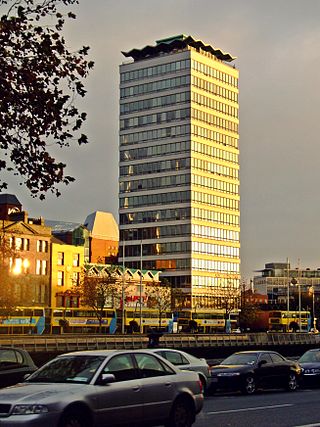Related Research Articles

SIPTU is Ireland's largest trade union, with around 200,000 members. Most of these members are in the Republic of Ireland, although the union does have a Northern Ireland District Committee. Its head office, Liberty Hall, is in Dublin, and the union has five industrial divisions, three in the private sector and two in the public sector. SIPTU is affiliated to the Irish Congress of Trade Unions.

James Larkin, sometimes known as Jim Larkin or Big Jim, was an Irish republican, socialist and trade union leader. He was one of the founders of the Irish Labour Party along with James Connolly and William O'Brien, and later the founder of the Irish Worker League, as well as the Irish Transport and General Workers' Union (ITGWU) and the Workers' Union of Ireland. Along with Connolly and Jack White, he was also a founder of the Irish Citizen Army. Larkin was a leading figure in the Syndicalist movement.

The Irish Transport and General Workers Union (ITGWU) was a trade union representing workers, initially mainly labourers, in Ireland.

The Civil and Public Services Union (CPSU) was an Irish trade union for clerical and administrative grades in the civil service, the wider public sector and the private sector. It was a member of the Irish Congress of Trade Unions.
The Workers' Union of Ireland (WUI), later the Federated Workers' Union of Ireland, was an Irish trade union formed in 1924. In 1990, it merged with the Irish Transport and General Workers Union to form the Services, Industrial, Professional and Technical Union (SIPTU).

The Irish Trades Union Congress (ITUC) was a union federation covering the island of Ireland.
The Communication Workers Union is a trade union in Ireland.

Thomas Farren was an Irish Labour Party politician and trade union official.

Patrick Thomas Daly, known as P. T. Daly was an Irish trade unionist and politician.
The Dublin Council of Trade Unions is the trades council for County Dublin in Ireland.

The Irish National Painters' and Decorators' Trade Union (INPDTU) was a trade union representing painters and decorators in Ireland.
The Irish National Union of Vintners', Grocers' and Allied Trades Assistants (INUVGATA), also known as the Barmen's Union, was a trade union representing retail and bar staff, principally in Ireland.
The Electrical Trades Union was a trade union representing electrical technicians and engineers in Ireland.

The Public Service Executive Union (PSEU) was a trade union representing civil servants in Ireland.
The Energy Services Union is a trade union representing workers at the ESB Group in Ireland.
The Irish Municipal Employees' Trade Union was a trade union representing employees of Dublin City Council in Ireland.
The National Engineering and Electrical Trade Union (NEETU) was a trade union representing engineering workers in Ireland.
The Building Workers' Trade Union (BWTU) was a trade union in Ireland.
The National Engineering Union (NEU) was a trade union in Ireland.
The Irish National Union of Woodworkers (INUW) was a trade union representing woodworkers in Ireland.
References
- ↑ Devine, Francis; Smethurst, John B. (2017). Historical Directory of Trade Unions in Ireland (PDF). Dublin: Irish Labour History Society & Working Class Movement Library. Retrieved 23 January 2025.
- ↑ Murphy, Angela. "Farren, Thomas". Dictionary of Irish Biography. Royal Irish Academy. Retrieved 27 January 2025.